Military Special
National Trans military advocacy group elects new president
Fram is a Lieutenant Colonel in the USAF

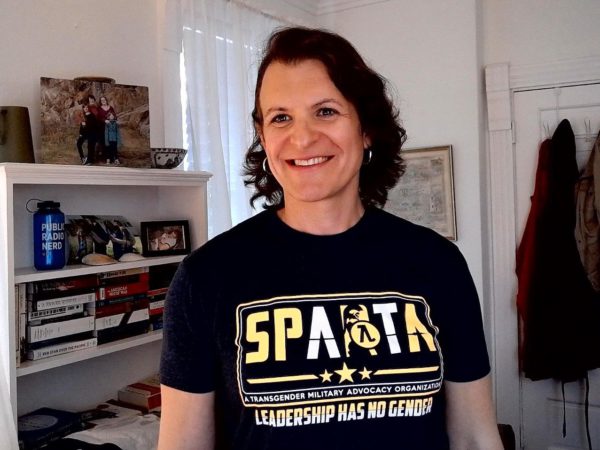
WASHINGTON – SPARTA, the nation’s leading transgender military service advocacy organization, announced Saturday that it had elected Bree Fram as its new Board Chair and President of the organization.
She has been a member of SPARTA since 2014 and has served on the Board of Directors since April 2018, most recently as Vice President. Fram is also a Lieutenant Colonel and astronautical engineer in the US Air Force and will soon be recommissioning into the U. S. Space Force.
She is currently a student at the US Naval War College with a follow-on assignment to the Department of Defense at the Pentagon.
“I’m honored and humbled to serve as SPARTA president on behalf of so many amazing transgender service member,” said Fram. “We will do our utmost to continue SPARTA’s a rich history of incredible dedication and progress. My heartfelt thanks go to the previous leaders of the organization, including Sue Fulton, Jacob Eleazar, Blake Dremann, and Emma Shinn, and all our members for the incredible achievements of the past 8 years. Despite setbacks, their desire to make transgender military service possible is reality again as of yesterday as the new Department of Defense Policy went into effect.”
The immediate past president, Emma Shinn served through a challenging time as President Trump’s ban on transgender service went into effect in April 2019. Her leadership rallied the organization and ensured SPARTA remained dedicated to positive change.
With the January 2021 Executive Order from President Biden directing the Defense Department to re-implement open transgender service, she and the organization celebrated a major success that will benefit all members of SPARTA and the nation.
“Leading SPARTA for the past two years has been a tremendous honor and privilege,” stated Shinn as her time at the head of SPARTA came to an end. She continued, “I am confident that SPARTA will continue to help our military and nation recognize the value trans service members bring to the mission. I am thankful for the opportunity SPARTA has given me to work with leaders in the DoD, legislators, and partner groups to make open trans service a reality again. I look forward to continuing to work with this amazing group of people under Bree’s leadership. I am excited for the future of our organization and nation.”
In a press release the organization noted that Fram’s remarks highlighted the fact that SPARTA’s mission is not over. “Although transgender service members have already proven they belong on the battlefield and here at home,” she said. “We need to ensure they can’t be erased in the future by an administration set on turning back the clock. Beyond ensuring our members can thrive in their careers, my top priority is to ensure the opportunity to serve is enshrined in law.”
Fram spoke on additional goals for SPARTA during her tenure and listed the following:
· Minimize the administrative burden and career impact of transition in the military
· Advocate for inclusion of transgender voices in policy making
· Push for inclusive policies regarding intersex and non-binary military service
“All Americans who are otherwise qualified to serve in the military should have the opportunity to do so,” Fram summarized. “This nation will be better and better defended with inclusive policies that enable the military to draw upon the best talent this nation has to offer.”
Military Special
Breaking the silence: 10 years after “Don’t Ask, Don’t Tell”
A special program exploring the “Don’t Ask, Don’t Tell” policy, the fight to repeal it and how it continues to affect those who serve

ARLINGTON – This year marks the 10 year anniversary of the repeal of “Don’t Ask, Don’t Tell”. This change in legislation allowed countless lesbian, gay and bisexual servicemembers to serve openly, but the negative effects of the policy continue to affect veterans today.
The Military Women’s Memorial put on a special program exploring the “Don’t Ask, Don’t Tell” policy, the fight to repeal it and how it continues to affect those who serve. MG (R) Tammy Smith joins to discuss her career, how she lived her life under “Don’t Ask, Don’t Tell” in the military and her advocacy to repeal the policy.
The program also explores how the “Don’t Ask, Don’t Tell” policy continues to impact people’s lives. The program Saturday, October 2, 2021, is moderated by Jennifer Dane, Air Force veteran and president of the Modern Military Association of America.
Breaking the Silence: 10 Years After “Don’t Ask, Don’t Tell”
Military Special
VA Secretary announces benefits for vets discharged under DADT
Don’t Ask, Don’t Tell forced about 14,000 service members out of the military during the 17 years that the policy was in place

WASHINGTON — The Department of Veterans Affairs announced Monday that LGBTQ veterans who were given ‘other-than-honorable discharges’ under the Don’t Ask, Don’t Tell policy before its repeal in 2011, will now be eligible for VA benefits, including health care, disability compensation, home loans and burial benefits.
Timing of the new policies was made to coincide with the anniversary of the repeal of DADT on Monday.
In a blog post Monday, Kayla Williams, the assistant secretary for public affairs in VA’s Office of Public and Intergovernmental Affairs wrote:
“At VA, we continuously work not only to meet the needs of LGBTQ+ Veterans, but also to address ongoing issues that LGBTQ+ Veterans face as a result of the military’s decades-long official policy of homophobia and transphobia,” Williams, who identifies as bisexual continued, “[…] LGBTQ+ Veterans are not any less worthy of the care and services that all Veterans earn through their service, and VA is committed to making sure that they have equal access to those services.”
Under the new guidance VA Secretary Denis McDonough sent to VA adjudicators on Monday, VA adjudicators, who decide whether to approve veterans’ claims for VA benefits, will no longer consider veterans ineligible because of their discharges for sexual orientation or gender identity, said Williams.
The VA will award a veteran his or her benefits unless the person’s military record shows another reason that he or she doesn’t qualify.
This policy statement does not represent a change in law, as Veterans who were discharged under DADT alone have been generally eligible for benefits under current statute and regulation. However, this policy reiterates what constitutes eligibility for benefits under law.
In addition, every ‘Character of Discharge’ case that is initially considered for denial will also get a second look before that action is taken. Given that large numbers of LGBTQ+ Veterans who were affected by previous homophobic and transphobic policies have not applied for a discharge upgrade due to the perception that the process could be onerous, “we are hopeful that this policy statement encourages more of them to contact VA to determine their eligibility for care and services,” Williams wrote.
Don’t Ask, Don’t Tell forced about 14,000 service members out of the military during the 17 years that the policy was in place. The policy was enacted under former President Bill Clinton’s administration in 1993, and it was repealed by former President Barack Obama on Sept. 20, 2011.
“Although VA recognizes that the trauma caused by the military’s decades-long policy of discrimination against LGBTQ+ people cannot be undone in a few short months, the Biden administration and Secretary McDonough are taking the steps necessary to begin addressing the pain that such policies have created,” Williams said.
“Given that large numbers of LGBTQ+ veterans who were affected by previous homophobic and transphobic policies have not applied for a discharge upgrade due to the perception that the process could be onerous, we are hopeful that this policy statement encourages more of them to contact VA to determine their eligibility for care and services,” she added.
Military Special
LGBTQ Vets with ‘less than honorable’ discharges will receive VA benefits
This will extend medical care, disability payouts, employment assistance & other benefits previously blocked
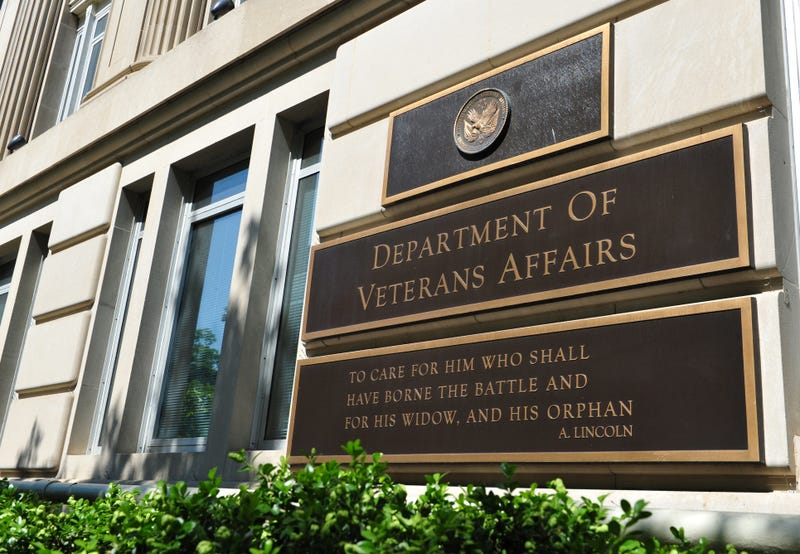
TYSONS CORNERS, Va. – Sources within the United States Department of Veterans Affairs have told Military Times this week that tens of thousands of LGBTQ veterans who were discharged from the U.S. armed services over the past seventy years, because of their sexual orientation or gender identity, will soon be able to receive full Veterans Affairs benefits.
In an article published Friday, Military Times White House Bureau Chief and Veterans Affairs correspondent Leo Shane III reported that an official announcement is set for sometime Monday, the tenth anniversary of the repeal of the ‘Don’t Ask-Don’t Tell’ law signed by then President Obama.
U.S. Veteran’s Affairs Secretary Denis McDonough has made a commitment to honoring the service of LGBTQ Veterans pledging to make the VA a place that “welcomes all veterans, including women, veterans of color, and LGBTQ veterans.”
In a Pride month speech this past June at the Orlando VA Healthcare System’s 11th Annual Pride Month Celebration, the Secretary highlighted the record of the first Gay man to openly challenged the military ban on LGBTQ service, Technical Sergeant Leonard Phillip Matlovich, United States Air Force:
“For generations, service members who identify as lesbian, gay, bisexual, transgender, or related identities faced brazen discrimination or even worse—not just in our Armed Forces, but in so many aspects of their lives. They lived in fear—of shunning, of violence, of having their lives turned upside down. And when it came to putting on the uniform and serving our country, they feared being denied that higher calling, too, simply because of who they were and who they loved.
When I think of those injustices, I think of Leonard Matlovich. Leonard Matlovich was a Vietnam War Veteran, a recipient of the Purple Heart and the Bronze Star, and a gay man who came out to the military and the world by appearing on the cover of TIME magazine in 1975.
He quickly became a symbol of defiance and freedom for so many LGBTQ+ people in America. He was also quickly issued an Other Than Honorable discharge from the Armed Forces, despite twelve years of decorated service.
Years later, after Matlovich passed, his grave became a rallying site for LGBTQ+ servicemembers everywhere. Instead of his name, he chose to inscribe his gravestone with a short phrase: “When I was in the military, they gave me a medal for killing two men and a discharge for loving one.”
The Secretary made it clear that the VA bureaucracy is capable of implementing this new policy although Shane noted that individuals with dishonorable discharges or clear criminal history documented in their service records will still not be granted benefits under the new plan.
Exclusive: Tens of thousands of LGBT veterans forced from the military over sexual orientation and given other-than-honorable discharges will be able to receive full VA benefits despite their dismissal status under a new move set to be announced Monday.https://t.co/kKcOO0nsAC pic.twitter.com/SHyb6rbzhB
— Military Times (@MilitaryTimes) September 17, 2021
The new move will extend VA medical care, disability payouts, employment assistance and other benefits individuals previously blocked because of other-than-honorable discharges.
Department legal officials believe the change will not require any new legislative action or policy statements, because the department already has broad authority to interpret which veterans are eligible for department services, the Military Times reported.
During his Pride speech in Orlando, also addressed healthcare concerns for LGBTQ veterans, especially Trans vets:
“We’re making these changes not only because they are the right thing to do, but because they can save lives. Due in part to minority stress, LGBTQ+ Veterans experience mental illness and suicidal thoughts at far higher rates than those outside their community, but they are significantly less likely to seek routine care, largely because they fear discrimination. This perpetuates a cycle in which LGBTQ+ individuals have lower rates of access to preventive care services, utilize health care services less frequently, and have more negative experiences with health care.
That’s unacceptable. And at VA, we’re doing everything in our power to show Veterans of all sexual orientations and gender identities that they can talk openly, honestly, and comfortably with their health care providers about any issues they may be experiencing.”
Further details are expected Monday as the Biden White House is also expected to mark the ending of DADT ten years ago. President Biden, who was Vice-President at the time has made LGBTQ equality rights a priority of his administration.
Military Special
Epic journey for General Leah Lauderback; surviving DADT to Space Force
For an openly out woman like Lauderback, the role as head of intelligence for a U.S. military service holds special significance.

ARLINGTON, Va. – You might not know it, but there’s a role for the U.S. Space Force in Afghanistan. It could well be one of the many topics Maj. Gen. Leah Lauderback, director of intelligence, surveillance and reconnaissance for the USSF, is briefed on each morning when she comes into her office at the Pentagon.
Lauderback, speaking last week with the Washington Blade’s chief political correspondent Chris Johnson, said that speaks to the role of the newly minted service as primarily a “space-enabling capability.”
“You can’t do anything with your iPhone as an example, with your computer, with the GPS in your car without those space-enabling capabilities,” Lauderback said. “And so that truly is our role in Afghanistan, to support the United States contingent that is there today, and that’s through our GPS capabilities or communications capabilities.”
Lauderback assumed the role as head of the office overseeing intelligence for U.S. Space Force last year shortly after the previous administration created it. With a record of intelligence-gathering roles in her three decades of serving in the U. S. Air Force, the sister service to the Space Force, Lauderback is a natural fit for the crucial position in the new service.

Still technically serving in the Air Force, Lauderback said she intends to leave the role next summer for a Guardian (the term bestowed to service members in the Space Force), and was chosen for the current role because she was a senior intelligence officer at the U.S. Space Command. Lauderback, nonetheless, said she was eager to take on those duties for a new service because she found the work “fascinating.”
“There is a lot of activity that is happening on orbit, and it’s not all good activity, right?” she said. “There are threats that present themselves almost on a daily basis. And so we were very busy, one, standing up to command at that time but then doing operational missions on a daily basis to compete with other near-peer competitors out there as well as to mitigate areas where we were in trouble from a threat perspective.”
One example Lauderback identified as a recent achievement came last year when a Russian satellite got very close to a U.S. satellite, and Gen. John Raymond, now commanding officer of U.S. Space Force, was able to push out into the media that the United States was concerned it was a Russian weapons system. The incident, Lauderback said, demonstrated U.S. capability to “call out the bad behavior and unprofessional behavior we thought of Russia.”
For an openly out woman like Lauderback, the role as head of intelligence for a U.S. military service holds special significance. Such a position would have been out of reach for an openly gay person in years past, when more LGBTQ people were closeted and the pervasive view was employing them in intelligence roles would be a national security threat if they were blackmailed.
Lauderback, who served when the military asked applicants whether or not they were homosexual and barred those who responded “yes,” recognizes the importance of an openly gay woman now heading up an entire office of intelligence for a U.S. military service.
“It’s really very significant that the fact that I can be out means that nobody can hold this over my head and I can serve openly and be the best intelligence officer that I could possibly be,” she said.
But it took a while to get there. Lauderback graduated from college in 1993, when “Don’t Ask, Don’t Tell” became the law of the land, and has had assignments in the military since that time as she continued to pursue advanced degrees. Under that law, Lauderback had to keep quiet about being a lesbian or risk being discharged.
“Certainly, when I first came out — and I was really enjoying my job, and I wanted to make the Air Force a career — but every day it was a concern, and absolutely made me untruthful at times, which is so embarrassing to say and humiliating at this point,” Lauderback said. “I had to lie at times. I was still hidden as a gay member in the service, but I trudged through that.”
Lauderback said during the years under “Don’t Ask, Don’t Tell” she became “less and less paranoid” and was able to find a friend at every base where she was stationed that she could trust with the truth about her sexual orientation. Those friends, she said, supported her on base and when she went on deployment.
Things changed in September 2011. After former President Barack Obama signed “Don’t Ask, Don’t Tell” repeal, the U.S. military certified it was ready to allow openly gay people in its ranks. The long ban was over and Lauderback was no longer forced to keep being gay a secret.
“I, like many others I’m sure, wept a little bit,” she said. “We had the conversations with friends about how different this was going to be, and it was very different. Immediately I felt the weight off my shoulders, immediately I knew that I had recourse if I felt that I was going to be discriminated against at any point in time, I felt that I knew I could go and make a complaint about things.”
Since that time, Lauderback married her spouse, Brenda Hall. The two have been happily married for years, Lauderback said.

But nearly 10 years since “Don’t Ask, Don’t Tell” was lifted, and shortly after transgender service members were allowed to begin service after President Joe Biden reversed the previous administration’s ban, Lauderback said issues for LGBTQ service members remain and many gay service members are still afraid to come out.
For that reason, Lauderback in March helped set up the LGBTQ Initiatives Team for the Air Force and Space Force, one of the barrier-analysis working groups ordered by senior leadership. Five months later, Lauderback said the task force continues to have conversations with leadership about policies, such as wording and terminology, that make people feel unwelcome in service.
“This barrier-analysis working group is really kind of grassroots,” Lauderback said. “While there are a few of us that are of higher rank on the team, it is mostly made up of folks that are much younger, have very different experiences than we do. And so, they are uncovering what are those barriers, those unconscious biases that folks have … and identifying those areas that we can start knocking out.”
One example of a change Lauderback said the team would “love to see” is the use of pronouns in some of the signature blocks in communications from service members.
“It is well known and well practiced outside of the military in the public sphere, but within the government, I don’t think anybody’s actually brought it up to the senior leadership,” Lauderback said. “If you could use a pronoun, and especially if it’s for transgender members, it could be for women, it could be for somebody who doesn’t have a Westernized name, it was really nice to be able to say, you know, in my signature block ‘she, her, hers.’”
Lauderback said her team is working through that change and thinks “we’ll be successful at some point.”
Meanwhile, Lauderback continues to wear her main hat as head of intelligence for Space Force, for which she manages the delivery of intelligence to the secretary of the Air Force and the chief of space operations and ensures analysts are adhering to the framework for rules in gathering intelligence.
“There’s just a lot of two steps forward, one step back type of potential, where you need to have facility space or you need to have — if it’s IT equipment and things like that,” she said. “And you have to hire people. So, we’re still making all of that happen in our directorate and across the entire enterprise, but I think we’re in a really good position, and certainly for the Space Force as it continues to mature, continues to grow.”
Space is made up of, well, mostly empty space, as any scientist will tell you. However, that adage is becoming incrementally less true as entrepreneurs, such as Elon Musk, continue to launch private satellites into orbit in numbers that could surpass the nearly 2,000 belonging to the United States. Starlink, the SpaceX program that manages its satellites, has 300 satellites in orbit — and has signaled plans for an eventual goal to deploy a total of 30,000 or more.
Lauderback, asked if that was a threat or should be welcomed, downplayed any concern of private companies surpassing U.S. government presence in space, saying the entrepreneurial endeavors would lower overall costs for launching satellites.
“It’s very much something to be welcomed, and we see it as a positive,” Lauderback said. “And I know Gen. Raymond as the CSO has remarked on this a number of times. What happens when you have commercial entities like this one, they’re able to operate sometimes at a much faster pace than we can in the government, so we want to be able to take advantage of that and then secondly, they truly drive the price point down for us.”
Launching astronauts into space remains an exciting event, including the prospect of sending the next human spaceflight to the Moon, and the first-ever landing on Mars. Lauderback, however, said she couldn’t comment directly because those projects are part of NASA’s domain.
“I would say, from my perspective as an intelligence officer,” Lauderback said, “when there is more exploration in space, as there has been on every other domain — the air domain or land domain or the maritime domain — the Department of Defense needs to be prepared to protect and defend our capabilities … so as an intelligence officer that’s really part of my job is to watch what it is that other countries might be doing or what their desires and their intentions are.”
While transporting human beings to other worlds continues to be an aspiration, questions have arisen recently about whether other worlds are sending living beings to Earth amid new interest in government reports on UFOs. U.S. intelligence over the summer revealed 140 sightings by American military pilots between 2004 and 2021 — and the Pentagon has no idea what they’re seeing.
Lauderback, asked what she makes of the findings given her position as head of space intelligence, declined to comment directly on what she makes of the phenomena, citing an ongoing study in other military services, although she quibbled with the use of the term “UFOs” to describe them.
“I would say it’s not UFOs, but it’s unidentified aerial phenomena,” Lauderback said. “So I key in on the term aerial in that case. I’ll leave it to the folks that are operating in the air domain and we’re working in the space domain, so I think that’s about all that I would be able to tell you.”

Luke Schleusener, president of Out of National Security, an affinity group for LGBTQ staffers in national security, said the absence of any backlash to an out lesbian in Lauderback’s position “tells us how far much of the country has come in the decade since the repeal of DADT.”
“She’ll bring her whole self to work,” Schleusener said. “At a time of ‘resurgent great power competition,’ having diverse teams and diverse leaders will make the Space Force more effective. It’s also a matter of our government and our military best serving the nation when our public servants and service members reflect those they’re sworn to serve, at all levels.”
Military Special
Pentagon sweeps away Trump policies on Trans service
This guidance is a welcome reprieve for the thousands of individuals whose lives and careers have been disrupted


ARLINGTON, Virginia – The Pentagon said Wednesday that it was reversing policies set in place by the Trump administration that barred Transgender Americans from serving in uniform.
The Defense Department also is updating and expanding wider access to medical care and assistance with gender transition for service members. The rule changes come after a two-month review ordered by Defense Secretary Lloyd Austin, who had enacted immediate orders to finalize detailed regulations that all branches of the military services will follow.
Austin’s actions immediately followed President Joe Biden’s Executive Order that overturned former President Trump’s ban on Trans service. The new rules also prohibit discrimination based on gender identity. Their expected release Wednesday coincides with International Transgender Day of Visibility, the Associated Press reported.
The AP also noted that Secretary Austin has also called for a reexamination of the records of service members who were discharged or denied reenlistment because of gender identity issues under the previous policy. Results of that review have not been released.
SPART*A, the nation’s leading transgender military service organization reacted to the changes being implemented Wednesday.
“We applaud this step to ensure the Department of Defense provides inclusive policy to attract and retain the best and brightest our nation has to offer,” said Vice President of SPART*A Bree Fram, a U.S. Air Force Lieutenant Colonel.
“Military personnel reach maximum effectiveness when they have access to all medically necessary care and we are excited that this policy extends that access to transgender service members. Additionally, opening recruitment to transgender individuals ensures an extremely talented and motivated pool of people that this country needs have the opportunity to serve in uniform,” Fram added.
The revised policy is a close mirror of the previous 2016 guidance, which first enabled open service by transgender individuals in the United States Military under the Obama Administration. The new guidance includes expanded information on transition while on duty, updated roles and responsibilities for DoD personnel, and other administrative and functional updates.
The Defense Department in April 2019 approved a policy that fell short of an all-out ban but barred transgender troops and recruits from transitioning to another sex and required most individuals to serve in what the Trump administration called their “birth gender,” the AP reported.
Individual branches are expected to release service-specific guidance in the near future including the United States Coast Guard which operates as a component of the Department of Homeland Security.
“This guidance is a welcome reprieve for the thousands of individuals whose lives and careers have been disrupted during the tumultuous transition from the 2016 open service policy to the 2017 implementation of the transgender ban,” Fram noted in an emailed statement.
“Now, they are excited for this opportunity that allows for open service once again. Additionally a new accessions policy allows for the recruitment of new transgender service members,” she added.
Military Special
VA Secretary orders greater LGBTQ inclusivity in agency care for veterans
“My goal as secretary is to make sure VA is welcoming to all veterans, including our transgender veterans,” he said.
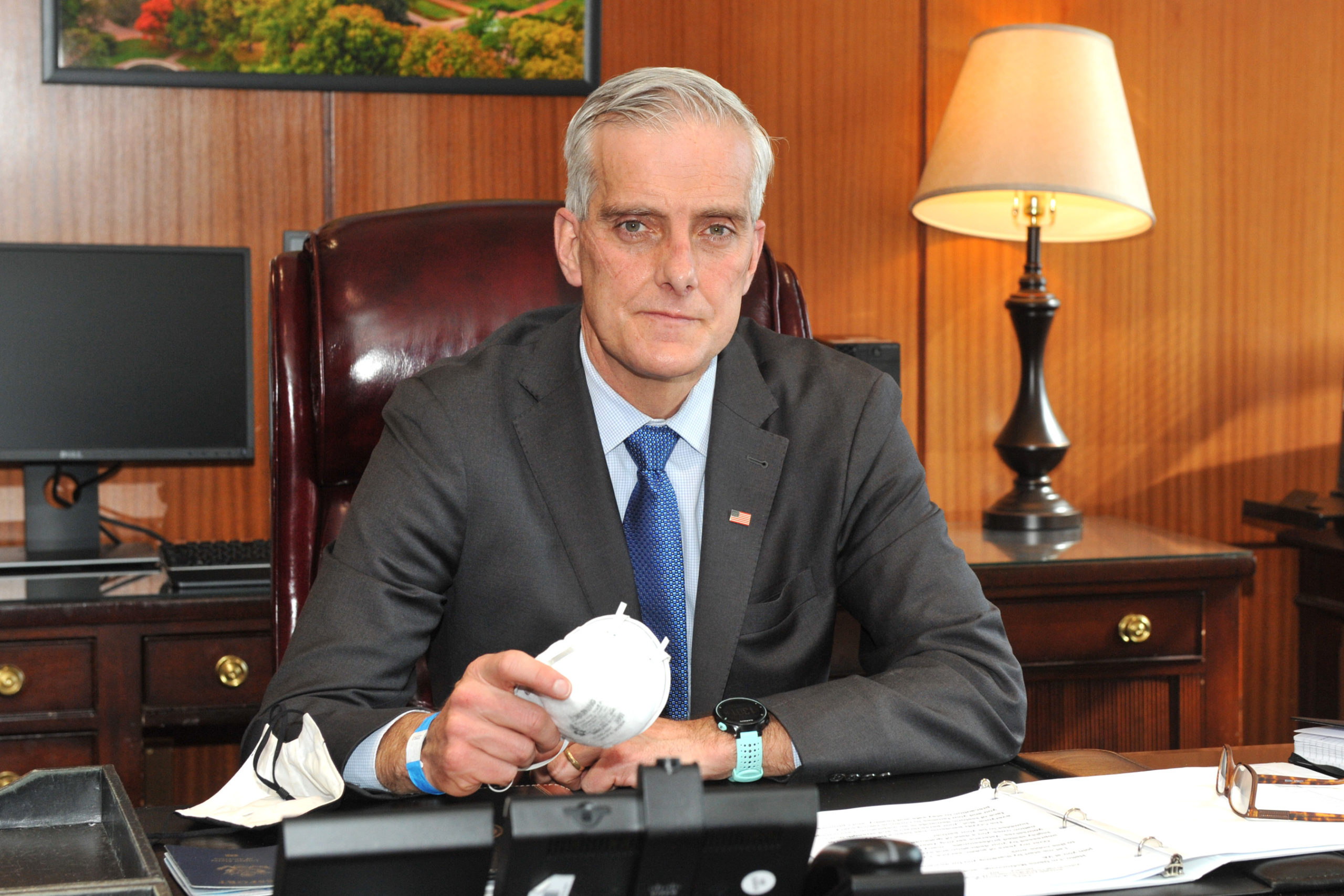
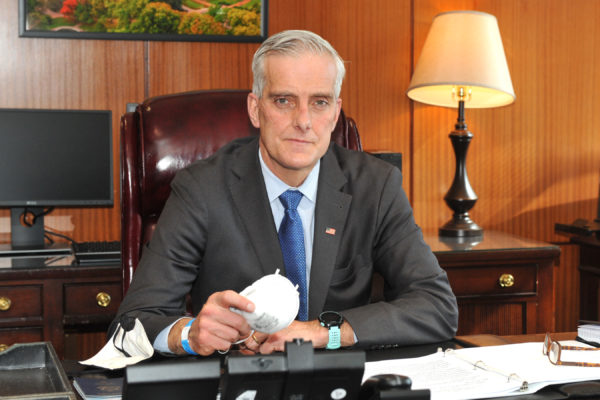
WASHINGTON – Veterans Administration Secretary McDonough issued a memorandum Tuesday directing his agency to review its policies and procedures as it relates to the care of LGBTQ veterans, their families, caregivers, survivors, and employees.
McDonough told reporters in a briefing that he expected the policy review would be finished by March 30.
“My goal as secretary is to make sure VA is welcoming to all veterans, including our transgender veterans,” he said.
McDonough stressed that he and his agency would focus on inclusivity, diversity and equity under his tenure as VA secretary following President Biden’s recently signed Executive Orders (Enabling All Qualified Americans to Serve Their Country in Uniform, signed on January 25, 2021, and Preventing and Combating Discrimination on the Basis of Gender Identity or Sexual Orientation, signed on January 20, 2021)
The Secretary told reporters that as he chooses his leadership team he will ensure that there would be full compliance with the president’s executive orders. He didn’t volunteer any further information on potential candidates for those positions.
“That will be a really important piece of demonstrating my seriousness about diversity and inclusion,” he said. “Our political appointees to date reflect that, and that’s intentional.”
Under the terms of the memo VA Under Secretaries and Staff Offices directed to execute the following:
Conduct a policy review to determine whether any regulations, directives, policies and procedures promote equity for and inclusion of LGBT Veterans, families, caregivers, survivors or employees. Design and implement a remediation plan if the review identifies discriminatory policies towards LGBT beneficiaries and employees.
Perform an assessment of the necessary steps to eliminate the exclusion of “gender alterations” as currently stated in the medical benefits package, more commonly referred to as gender affirmation care and services, to include assessment of statutory and regulatory requirements as well as funding, staffing, technology and other resources required to provide all medically necessary services.
Develop means to measure the experience of LGBT beneficiaries and employees and to include their perspectives in the development of future guidance and any barriers that LGBT beneficiaries and employees may face in accessing the full range of VA care, benefits and services are identified and addressed.
Develop a plan to ensure that employees are trained on inclusive, respectful and welcoming interaction with LGBT beneficiaries and implement an enterprise plan to enhance data and information systems with respect to sexual orientation and gender identity, such that beneficiaries and employees may independently and securely self-identify and be addressed by their preferred name and pronouns.
Stars and Stripes reported that McDonough also promised to address racial inequity at the agency during the news briefing. Last year, a group of Black VA employees organized to voice their experience with racism, which they said was made worse by leaders who refused to address it.
“Confronting this question of racial inequity will be a fundamental part of my tenure here, not least because the president is demanding it,” he said.
The VA currently provides LGBTQ specific care to veterans. California, the most populous state in the nation, has the largest veteran population (1.56 million) including LGBTQ vets.
Coronavirus
Supplies tight new vaccinations limited- new mass vaccination site at Cal Poly Pomona
#NoSuperSpreaderSunday
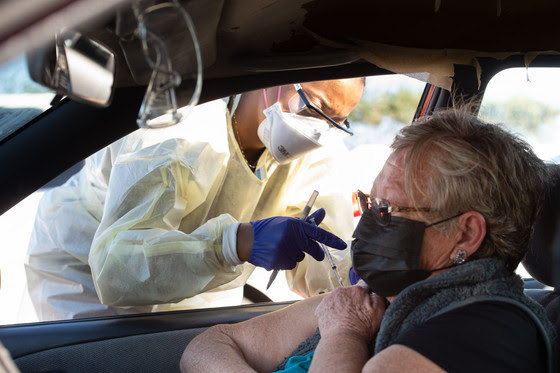
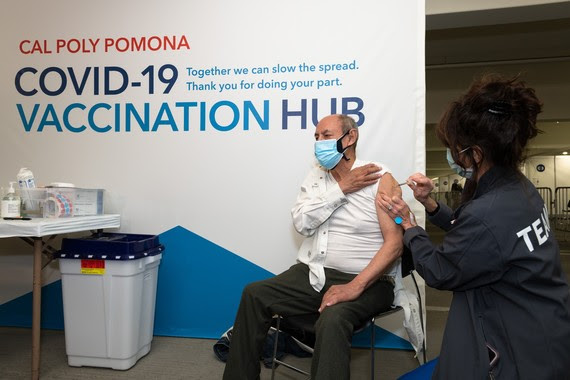
POMONA – The first large scale federal-state community vaccination center in Southern California opened Friday on the campus of Cal Poly Pomona and is slated to run seven days a week.
The new site located in the university parking area will start by offering about 500 to 1,000 appointments in its first few days, then ramp up to eventually offer between 8,000 to 10,000 vaccinations daily by February 16 officials said.
“I am grateful to President Biden and Governor Newsom for answering my call and marshaling federal and state resources to significantly increase our ability to vaccinate our residents,” said Chair of the Los Angeles County Board of Supervisors Hilda L. Solis.
“Our County and in particular our Latinx residents have been absolutely devastated by COVID-19. Establishing this large scale federal-state community vaccination center on the Cal State LA campus, in the heart of Los Angeles County and in a hard-hit community, is a welcome signal that we are ramping up at the federal, state and local level with the practical, boots-on-the-ground solutions we need to put an end to this deadly pandemic.”
According to a news release from Kaiser Permanente, which is one of several health care providers offering vaccinations on the campus, The Cal Poly Pomona site is structured initially to prioritize vaccinating people 65 years and older, but eligibility will expand as more of the vaccine supplies becomes available.
Appointments for the next few days are fully booked, but more appointment slots will be released in the coming days Supervisor Solis. said in a media release. Appointments are required and can be made using the state’s MyTurn scheduling system or by calling (833) 540-0473 for assistance.
Dr. Paul Simon, the county’s chief science officer during a press briefing Friday cautioned that there was a very limited supply as these mass inoculation sites begin operations.
“We’re just struggling with the supply, the limited supply, and feeling an obligation to make sure that people who have had a first dose are able to get their second dose,” Simon said.
There will be a “very limited” amount of first doses given out Monday, and starting Tuesday the five mass vaccination sites it runs will only give second doses he told reporters.
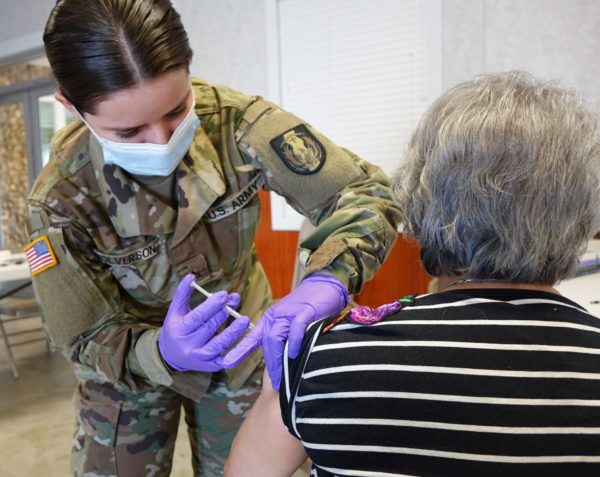
(Photo Credit: Texas National Guard)
The Pentagon will deploy more than 1,000 active-duty troops to support coronavirus vaccination efforts at multiple locations throughout the United States, Chief Pentagon spokesman John Kirby announced Friday. Stars & Stripes reported that troops will start arriving in a little over a week to run a new site at Cal State L.A. opening February 15 according to Andy Slavitt, a White House coronavirus adviser.
“The military’s critical role in supporting sites will help vaccinate thousands of people per day and ensure that every American who wants a vaccine will receive one,” Slavitt said.
Gov. Gavin Newsom has acknowledged the initial vaccine rollout was unacceptably slow and had the state ranked near the bottom nationally. There’s been improvement and the state now is averaging 1 million shots a week but limits on the supply coming from the federal government means California’s capacity to provide shots far outstrips available vaccine.
The Los Angeles County Department of Public Health confirmed 226 new deaths and 4,761 new cases of COVID-19 Friday. To date, Public Health identified 1,138,764 positive cases of COVID-19 across all areas of L.A. County and a total of 17,764 deaths.
In a statement issued Friday Public Health urged Angelenos not to gather for Super Bowl Weekend:
Gathering with people outside of your household, especially in settings where people are shouting, chanting, or singing and not distancing can easily lead to increased cases of COVID-19, serious illness, and more deaths. Public Health recommends residents to play it safe and enjoy the Super Bowl with people you currently live with, and to connect virtually with other friends and family who live outside of your household. Please do not gather with people from outside your household to watch the Super Bowl.
Public Health officials are closely monitoring the number of deaths. More than 1,000 new COVID-19 deaths have been reported since Monday. Even as cases and hospitalizations decline, deaths may remain high for two more weeks.
“I want to remind everyone how important it is to celebrate the Super Bowl only with members of your household. This fall and winter, we learned painful and tragic lessons about how gatherings and celebrations lead to transmission of COVID-19 that ultimately results in a great deal of serious illness and death,” said Dr. Barbara Ferrer, Director of Public Health.
“While we continue efforts to ensure that vaccine makes it into more arms, we implore everyone to stay home as much as possible, to not gather, and to do everything you can to prevent transmission of the virus. Please do the right thing: wait your turn for a vaccine and allow those eligible for the vaccine to register and be vaccinated.”

The Los Angeles County Department of Public Health urges eligible residents to check www.VaccinateLACounty.com regularly for appointments.
Residents with internet access and a computer should use the website to sign up for an appointment when eligible or to see when their turn is coming up.
The call center is available and reserved for people with disabilities or who don’t have a computer or internet access. For those without access to a computer or the internet, or with disabilities, the call center is open to help schedule appointments daily from 8:00 a.m. to 8:30 p.m. at 833-540-0473. The call center uses the same system as the online system and is a low-tech way for those with accessibility needs and older people who may not have a computer or a smart phone, to make an appointment.
As more people are vaccinated, the County will be watching very closely to assess progress in ensuring equitable distribution of the vaccine. Residents should remain diligent in adhering to the physical distancing, face masking, and other precautions necessary to prevent spread of the virus, even after being vaccinated.
Military Special
Trans ban lifted; Defense Sec. Austin says Pentagon will ‘expeditiously’ implement
The action taken today by the president fulfills a campaign promise made by Biden to lift the ban.
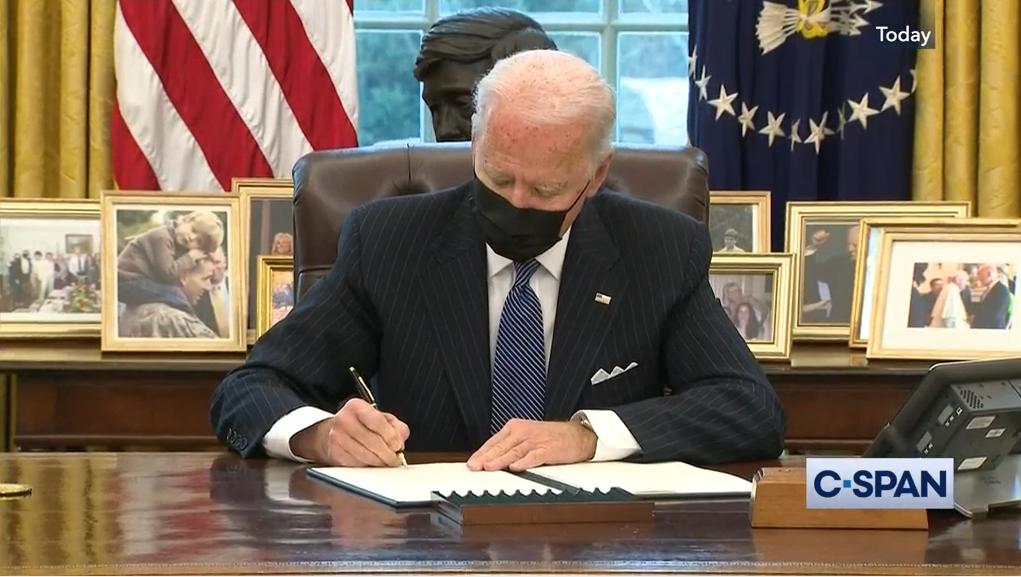
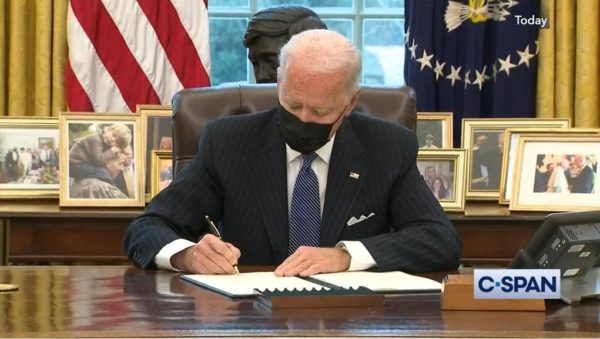
WASHINGTON – With a stroke of a pen Monday afternoon, President Joe Biden affixed his signature to an Executive Order that lifts the ban imposed by President Donald Trump barring Transgender Americans from serving in uniform in the armed forces in its entirety.
The order provides that “all transgender individuals who wish to serve in the United States military and can meet the appropriate standards shall be able to do so openly and free from discrimination.”
The order directs the Secretary of Defense to implement the policy and to “take all necessary steps to ensure that all directives, orders, regulations, and policies” of the Department of Defense “are consistent with this order.”
The action taken today by the president fulfills a campaign promise made by Biden to lift the ban. Although the president had indicated publicly that reversing his predecessor’s would be a ‘Day-One’ priority, administration sources told the Blade Sunday afternoon that the president and his senior advisors had opted to wait to take action until incoming Secretary Austin had been fully confirmed by the Senate.
Austin, a retired four-star Army general, had been confirmed by the Senate, in a near-unanimous 93-2 vote this past Friday,
Seated behind the Resolute Desk in the Oval Office facing members of the White House Press Corps and flanked by Chairman of the Joint Chiefs of Staff, General Mark A. Milley, Vice-President Kamala Harris, and newly confirmed Secretary of Defense Lloyd Austin, Biden addressed the press corps and others in the room;
Well, folks, thank you very much for being here. I’m about to sign an executive order, but I want to begin by thanking the Vice President for helping this, but also thank Chairman Milley, who has been a great, great help, and then also the soon-to-be Secretary of Defense, who, when we can finish this, will be sworn in in a moment. And so, don’t say anything to cause him to change his mind, okay?
But all kidding aside, this is reinstating a position that previous commanders and — as well as the Secretaries have supported. And what I’m doing is enabling all qualified Americans to serve their country in uniform, and essentially restoring the situation as it existed before, with transgender personnel, if qualified in every other way, can serve their government in the United States military.
So that’s what I’m about to sign. And I’m going to get a chance, I’m told, a little later on another matter — later this afternoon when I speak to another order — to answer all your questions on a whole range of things. But I’m going to be going to the swearing-in shortly after this. Okay? Thank you, again.
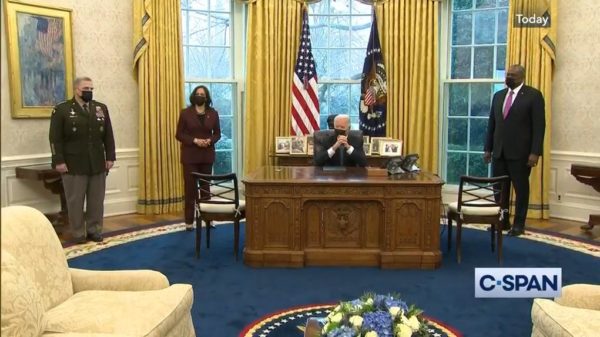
U. S. House Speaker Nancy Pelosi in a statement issued by her office after the president’s action took direct aim at former President Trump’s ban.
“Today is a day of great hope and progress for thousands of heroes in our military and indeed for our entire country, as the Trump transgender ban is thrown into the trashbin of history. Led by President Biden, America is restoring our proud pledge: that no one with the strength and bravery to serve in the U.S. military should be turned away because of who they are.
“The Trump ban was a cruel and arbitrary decision designed to humiliate transgender Americans who have stepped forward to serve our country. The Biden-Harris Administration and Democratic Congress will continue to reverse this and other discriminatory actions that weaken our military readiness and betray our core American values.
“Democrats’ defense strategy will be dictated by the priorities of security, stability, peace and American values – not the hate and prejudice that defined the Trump presidency.”
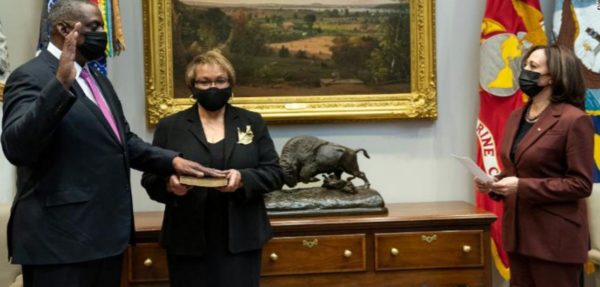
(Photo Credit: Screenshot CNN)
After he was ceremonially sworn in by Vice President Kamala Harris as the 28th Secretary of Defense, Austin issued a statement detailing the implementation of the executive order.
- “The Department will immediately take appropriate policy action to ensure individuals who identify as transgender are eligible to enter and serve in their self-identified gender. These changes will ensure no one will be separated or discharged, or denied reenlistment, solely on the basis of gender identity.”
- “Prospective recruits may serve in their self-identified gender when they have met the appropriate standards for accession into the military services.”
- “This revised policy will also ensure all medically-necessary transition related care authorized by law is available to all Service members and will re-examine all cases of transgender Service members that may be in some form of adverse administrative proceedings.”
Secretary Austin then noted that Pentagon officials over the next 60 day period would “expeditiously develop the appropriate policies and procedures to implement these changes.”
The Blade spoke with Shannon Minter, a civil rights attorney and the Legal Director for the National Center for Lesbian Rights, who offered an analysis on what to expect as the process post-ban moves forward.
“In practice, this means that transgender people will once again be able to enlist in the military provided they meet the same fitness standards applied to other recruits. It means that servicemembers who come out as transgender while serving will not be kicked out or otherwise disadvantaged because they are transgender, Minter said.
“Transgender service members will be provided with transition-related medical care, they will be able to change their military records and classification to match their gender, and they will be able to live and serve as their authentic selves.”
Commenting on the actions taken today first by the president and then Secretary Austin’s statement Minter remarked;
President Biden specifically ordered the Secretary of Defense to immediately identify any service members who have been discharged for being transgender so that their records can be corrected and that those who wish to do so and can meet the current standards have an opportunity to reenlist.This is a sweeping reversal of the Trump ban and a clear commitment to ensure equal treatment of transgender service members and recruits in every aspect of military service, from enlistment standards to military records to medical care.
In his statement Secretary Austin pointed out;
The United States Armed Forces are in the business of defending our fellow citizens from our enemies, foreign and domestic. I believe we accomplish that mission more effectively when we represent all our fellow citizens. I also believe we should avail ourselves of the best possible talent in our population, regardless of gender identity. We would be rendering ourselves less fit to the task if we excluded from our ranks people who meet our standards and who have the skills and the devotion to serve in uniform.
This is the right thing to do. It is also the smart thing to do.
Minter reflected on the Defense Secretary’s statement then told the Blade,
This is a major turning point in the history of transgender rights. We will look back on today’s executive order as the foundation of a new era of legal and social acceptance for transgender people in this country. The opportunity to serve in our nation’s armed forces on equal terms has been the cornerstone of many other civil rights movements, and will be one here as well.
While nothing can fully undo the damage inflicted on transgender service members by the Trump ban, the determination to reverse that policy has led President Biden to issue the most affirmative executive order affecting transgender people in our nation’s history. The policy he ordered the Secretary of Defense to implement is an unequivocal endorsement the humanity and dignity of transgender people, who can now count on the full support of their Commander in Chief, the Secretary of Defense, and the senior leadership of our nation’s military. This is a stunning development, and one that will forever change the place of transgender people in our society.
Minter alongside his co-counsel Jennifer Levi, were lead attorney’s in the first case to challenge Trump’s ban, Doe v Trump, as well as Stockman, a related California Trans military case.
“It is my highest goal to serve my country in the U.S. military and I’ve fought this ban because I know that I am qualified to serve,” said Nicolas Talbott, an aspiring service member who is a plaintiff in Stockman v. Trump. “I’m thrilled and relieved that I and other transgender Americans can now be evaluated solely on our ability to meet military standards. I look forward to becoming the best service member I can be.”
Minter and Levi also represent an individual service member named Blaire McIntyre who serves in the Michigan National Guard in another case challenging the ban.
“Our fight to end the transgender military ban was about equal opportunity, fairness and service, and President Biden’s order today honors those shared national values,” said Jennifer Levi, Director of Transgender Rights Project at GLBTQ Legal Advocates & Defenders. “Transgender Americans can and will bring needed skills to our armed forces at every level, and I look forward to seeing our nation benefit from the contributions of a new generation of transgender leaders and patriots.”
Minter told the Blade that today’s action by Biden provides the relief that transgender individuals were seeking by suing to overturn the Trumps Trans Military Service Ban. “There is no other way to frame this action,” he said.
President Biden has simultaneously put an end to an unpatriotic, discriminatory policy and given hope to thousands of qualified transgender servicemembers and their families,” said Rick Chavez Zbur, Executive Director of Equality California — an organizational plaintiff in Stockman v. Trump.
“Today is the result of countless transgender patriots — like Nic Talbott and so many others — speaking up to defend their livelihoods and their country. Equality California has always stood with our transgender troops, but we are especially proud to do so today.”
History
Biden will reverse trans military service ban
Reversing the Trump decision was a campaign commitment to the LGBTQ community by the president early on
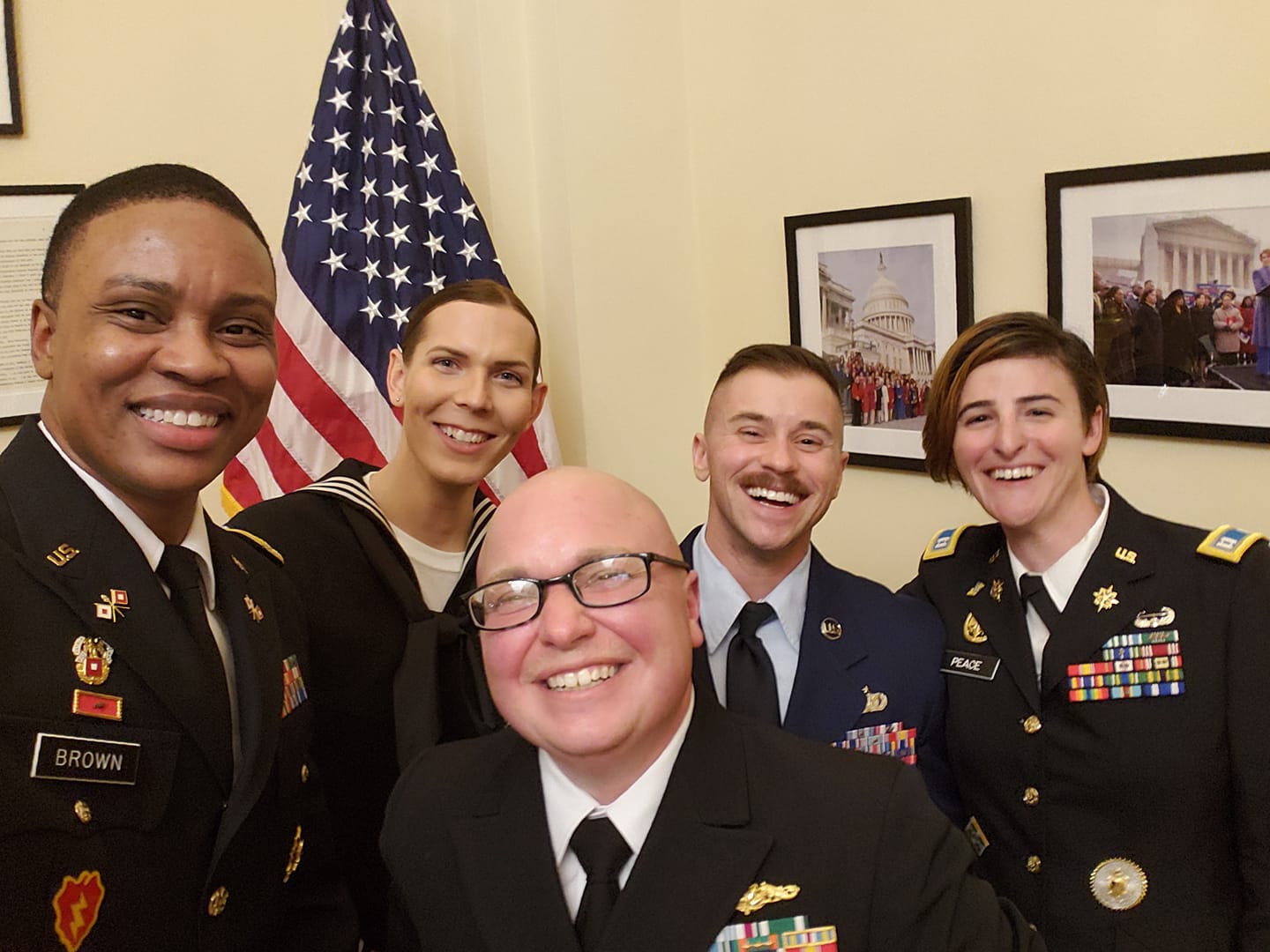
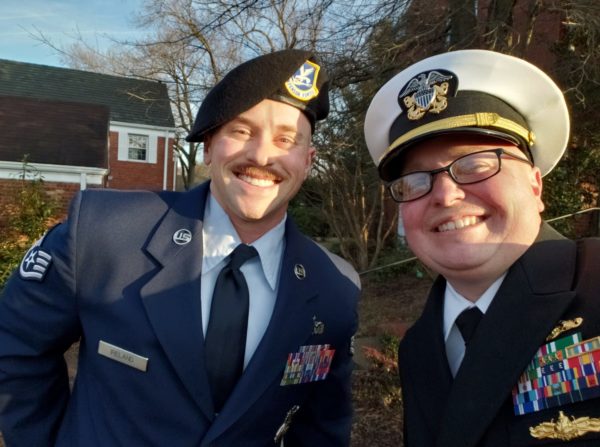
(Photo Credit: TSGT Logan Ireland used by permission)
WASHINGTON – President Joe Biden is expected to sign an executive order reversing the ban on Transgender military service Monday, January 25, the Los Angeles Blade confirmed Sunday.
Reversing President Trump’s decision to ban Trans Americans from open military service was a campaign commitment to the LGBTQ community by the president early on.
“The Modern Military Association of America is delighted and relieved that both President Joe Biden and Secretary of Defense, General Lloyd Austin, are committed to repealing the discriminatory transgender service ban. This action speaks volumes to the LGBTQ military and veteran community. We look forward to continuing to work with the Biden Administration to ensure that all who are capable and qualified are able to serve.” Jennifer Dane, Air Force Veteran & Executive Director, told the Blade in an emailed statement.
LGBTQ activists had pushed the Biden-Harris Transition Team immediately after the election for a ‘Day One’ commitment to reverse the ban. White House sources told the Blade Sunday afternoon that the president and his senior advisors had opted to wait to take action until the incoming Secretary of Defence Lloyd Austin had been fully confirmed by the Senate.
Austin, a retired four-star Army general, had been confirmed by the Senate, in a near-unanimous 93-2 vote Friday, making him the first Black defense secretary in U.S. history.
“SPART*A is incredibly excited for the opportunity being granted by the Biden administration. Thousands of troops currently serving in silence will now be able to reach their full potential in the military,” Lt. Colonel Bree Fram, USAF, Communications Director for SPART*A told the Blade in an emailed statement. “Countless others who have waited for a chance to serve their country will now be able to bring their talents to the military. We proudly look forward to serving alongside them.”
Austin, said for the first time publicly this past week, during his Senate confirmation hearing, that he supports efforts to overturn the transgender military ban.
Austin made the comments under questioning from Sen. Kirsten Gillibrand (D-N.Y.), who has taken the lead on the issue in the Senate Armed Services Committee.
“I support the plan to overturn the ban,” Austin said. “I truly believe that if you’re a fit and you’re qualified to serve and you can maintain the standards, you should be allowed to serve.”
The president is expected to announce his action during the formal ceremonial swearing-in of the newly-confirmed defense secretary Monday at the White House.
Secretary Austin is expected to order the Pentagon to return to the policy implemented in 2016 by former Obama administration Defense Secretary Ash Carter, that allowed transgender Americans to serve openly in all five of the military service branches.
The White House has not responded to a request for comment.
Military Special
The military #MeToo movement: 6,769 reports of sexual assault in 2017


“Preventing sexual assault is our moral duty,” Defense Secretary James N. Mattis wrote in an April 18, 2018 agencywide memo for Sexual Assault Awareness and Prevention Month. “By its nature, sexual assault is one of the most destructive factors in building a mission-focused military.”
Mattis, who abruptly resigned Thursday, Dec. 20, over principled disputes with President Donald Trump, aligned the issue of sexual assault with military readiness and the ability to recruit and retain the best people.
“While casualties on the battlefield are understood to be consistent with our military duties, I accept no casualties due to sexual assault within our ranks,” he said. “Military leaders are to be zealous in carrying out in loco parentis responsibilities and ridding our ranks of such illegal, abhorrent behavior.”
According to the Defense Department’s Annual Report on Sexual Assault in the Military, released May 1, sexual assault reporting increased by about 10% in fiscal year 2017 in all four branches of the military. The DoD received 6,769 sexual assault reports with servicemembers involved as either victims or subjects of criminal investigation, a 9.7 percent increase over the 6,172 reports made in fiscal 2016.
“Every sexual assault in the military is a failure to protect the men and women who have entrusted us with their lives,” Navy Rear Adm. Ann M. Burkhardt, the director of the Defense Department’s Sexual Assault Prevention and Response Office, told reporters. “We will not rest until we eliminate this crime from our ranks.”
Yeah, but few people believe that. In fact, even when scandals break into the open from Tailhook in 1991 to the more recent Marines United Facebook scandal, the military manages to cover for their own.
New York Sen. Kirsten Gillibrand first introduced the Military Justice Improvement Act in 2013, for instance. The bill would take processing sexual assault cases out of the military justice system—specifically, it would give the decision whether to prosecute serious crimes to professional military prosecutors instead of the commanders of the victims, an inherent conflict of interest if the alleged assailant is in the same unit. Gillibrand’s bill has been blocked every year; though in Nov. 2017 it was introduced with 27 co-sponsors.
The military rank structure in the military’s 24/7 work environment seems to always receive deference. “You can’t just tell the boss to go to hell, you can’t not show up to work,” said Retired Air Force Col. Don Christensen, a former JAG chief prosecutor, now president of Protect Our Defenders in a Feb. 7 report for Task & Purpose. “You know that to a degree much greater than in any other industry, this person is controlling your entire future. It’s almost like a master/serf relationship in some ways.”
“Sexual harassment is quite common in the military,” said Andrew Morral, co-author of the 2014 RAND Military Workplace Study, in the Task & Purpose report. “Across all ranks and pay grades, 75% of women say it’s common or very common, and it’s super highly correlated with sexual assault experiences.”
Protect Our Defenders and the Service Women’s Action Network (SWAN) support Gillibrand’s legislation and effort to reform the military justice system. SWAN was deeply involved in 2013 Oscar-nominated documentary “The Invisible War” which Gilibrand credits with helping shape her bill.
Protect Our Defenders has been serving as a watchdog, calling out the Pentagon’s “misleading and unsupported claims” during the contentious July 2013 Senate debate over Gilibrand’s bill.
“In testimony and a letter to Congress, Admiral James Winnefeld, Vice-Chairman of the Joint Chiefs of Staff, claimed that there were a number of cases where civilian prosecutors ‘refused’ to prosecute and military commanders subsequently ‘insisted’ those cases be sent to court-martial,” they reported last April. “Through a Freedom of Information Act (FOIA) request, Protect Our Defenders obtained and analyzed the underlying case documents. Our analysis reveals that the Pentagon exaggerated and distorted the facts in order to undermine fundamental reform of the military justice system. These findings are detailed in our report, Debunked: Fact-Checking the Pentagon’s Claims Regarding Military Justice.”
The Task & Purpose story “‘Continuum Of Harm’: The Military Has Been Fighting Sexual Assault In Its Ranks For Decades, But Women Say It’s Still Happening” also cites statistics on LGBT servicemembers:
“According to the DoD, members identifying as LGBTQ are more likely to experience “unwanted gender-related behaviors.” In 2016, the rate of sexual assault was 4.5% for service members who identify as LGBTQ, and 0.8% for those who do not. “It’s obviously a risk factor, or these people are targeted,” according to Morral.
Several women who identify as lesbian told Task & Purpose that they were sometimes treated like prizes whom men would try to “turn” or “straighten out.”
The report also cites an instance of “throwing sexist language around” but the lesbian soldier didn’t report it because “The guys thought I was on their side.” Nor did she report attitudes of sexual harassment because “Don’t Ask, Don’t Tell was still policy at the time, (the lesbian) said she didn’t feel comfortable pushing back against inappropriate comments for fear she might be outed.”
“I had another soldier in my unit go to my commander and say, ‘You should investigate her because she’s the only girl not sleeping with anybody in the unit,’” recalled Christine, a former enlisted Army mechanic, forced to refer to her girlfriend as her boyfriend just to avoid violating the DoD policy.
On Feb. 7 this year, CNN produced a piece “From fellow soldier to ‘monster’ in uniform: #MeToo in the military” that also challenges the military’s statement about taking sexual assault and sexual harassment seriously:
In November, 200 women working in national security signed a letter titled #metoonatsec, stating that this is a problem they also face.
Those who signed the letter included women who have worked as ambassadors, civilians at the Pentagon, military officers, staffers on Capitol Hill and professors as well as women in the nonprofit and think tank worlds.
“This is not just a problem in Hollywood, Silicon Valley, newsrooms or Congress,” the women said in their letter. “It is everywhere.”
While individual LGBT servicemembers had to figure out whether they would report any sexual harassment or assault during the original gay ban, after DADT went into effect, they had Servicemembers Legal Defense Network to give them guidance and legal assistance. And a proper recording of history will give lesbian attorney and former Army Captain Michelle Benecke the lion’s share of credit for persistently forcing the military to even acknowledge they had a severe problem with sexual harassment.

SLDN co-founder and former Army Capt. Michelle Benecke with SLDN executive director Aubrey Sarvis, and former Army Capt. Jonathan Hopkins at first OutServe Conference in Las Vegas in Oct. 2011 (Photo by Karen Ocamb)
As she details in her extraordinary history of DADT—“TURNING POINTS: CHALLENGES AND SUCCESSES IN ENDING DON’T ASK, DON’T TELL”—Benecke and attorney C. Dixon Osburn founded SLDN the day after President Bill Clinton announced he would not lift the gay ban, as he had repeatedly promised, but instead would issue a “compromise” with Congress to allow gay service with a gag rule: any indication that the servicemember was LGBT would be grounds for discharge, including simple statements which had previously been distinguished from gay “behavior.”
Often in the case of “he said-she said” where the “she alleged assault and they “he” refuted the assault and claimed the “she” was a lesbian—military commanders would investigate the allegation of sexual orientation rather than the allegation of assault. Benecke repeatedly and very publicly raised the issue of “lesbian-baiting” as a direct result of DADT.
Here’s an important extended excerpt from Benecke’s footnote-heavy chapter “Countering the Persecution of Women Under Don’t Ask, Don’t Tell” in her must-read account:
Lesbian baiting is “the practice of pressuring and harassing women through calling, or threatening to call them, lesbians.” Women often are accused of being lesbians when they rebuff sexual advances by men or report sexual abuse. In other cases, women are harassed because they depart from gender stereotypes, for example, “[w]omen who are top performers in nontraditional fields are also subject to lesbian accusations, rumors and speculation designed to undermine their professional standing.”
In the military, lesbian baiting gained legitimacy and power from DADT and prior gay bans, under which women have been discharged regardless of their actual sexual orientation, and the military’s criminal justice system, which was enforced selectively against gay people prior to SLDN’s involvement. Too often, commanders investigated military women “under the guise of [DADT] rather than disciplining the individuals” who harmed them.
Lesbian baiting is one of the main reasons why women were disproportionately investigated and discharged under DADT and prior policies. In SLDN’s second annual report, for example, we found that “[w]omen were disproportionately hurt by the new [DADT] policy, accounting for 30% of SLDN cases and 21% of DOD discharge figures, despite making up only 13% of the military’s active force.”
The following fiscal year, in 1996, women accounted for “29% of gay discharges, despite making up only 13% of the active force”; “[i]n the Army, women accounted for 41% of gay discharges, three times their presence in the service.” This disparity remained consistent throughout the DADT era.
SLDN pressed military leaders to recognize lesbian baiting as a form of sexual harassment and attempted to bar commanders from initiating inquiries based on retaliatory accusations. In 1997, the Department of Defense, for the first time, officially acknowledged lesbian baiting and issued guidance clarifying that commanders should respond to anti-gay harassment and lesbian baiting by investigating the harassment itself, not servicemembers who report it (the “Dorn memo”).
When the Dod didn’t distribute the Dorn memo, SLDN called for it to be reissued.
“An April 1998 Department of Defense report adopted this recommendation: ‘[I]t is critical that military service women feel free to report sexual harassment or threats without fear of reprisal or inappropriate governmental response. . . . [W]e recommend that the Department reissue guidance [the Dorn memo] to make clear that when sexual harassment is reported, the focus of the investigation must be on the harassment or threat,’” Benecke wrote.
Congress and an Army Review Panel expressed concern about lesbian baiting and urged action. The Dorn memo was finally sent out in 2000 as a reform prompted by the murder of PFC Barry Winchell at Fort Campbell, Kentucky.
“Implementation of the Dorn memo in the field was far from perfect. However, recognition of lesbian baiting as a form of harassment was a step forward,” Benecke wrote. “[T]here are women serving today who otherwise would have been railroaded out of the military were it not for these developments. On a broader level, SLDN’s documentation of widespread lesbian baiting underscored one means by which DADT, like prior policies, perpetuated sexual violence in the military. Over time, this contributed to eroding public support for DADT.”
As America and the LGBT community, slip into the New Year, many are asking what the standards for the military will be now that the last “guardrail” on amoral President Trump has been removed with Sec. of Defense Mattis’s resignation. Will the center hold?
-

 California3 days ago
California3 days agoHate crimes targeting transgender and gender nonconforming people have tripled since 2013
-

 a&e features4 days ago
a&e features4 days agoAllison Reese’s advice? Take your comedic medicine.
-
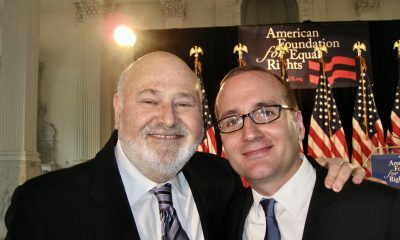
 COMMENTARY2 days ago
COMMENTARY2 days agoWhy Rob Reiner’s murder hit this old lesbian hippie so hard
-

 a&e features2 days ago
a&e features2 days agoIndya Moore on history-making Gotham Award nomination and speaking out on social media: “It has complicated my access to work”
-

 Movies1 day ago
Movies1 day agoLong-awaited ‘Pillion’ surpasses the sexy buzz
